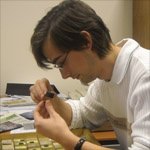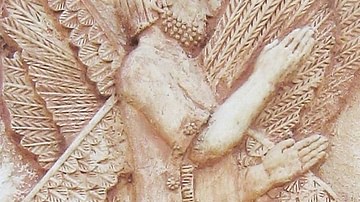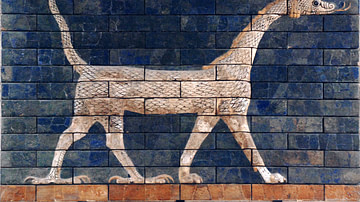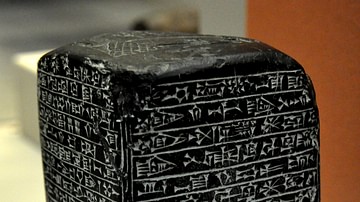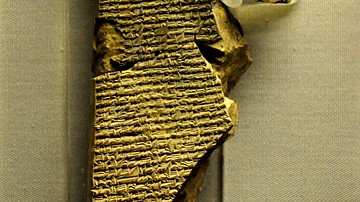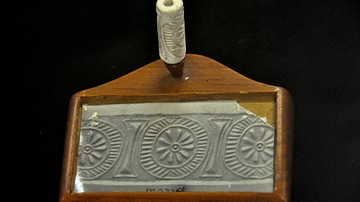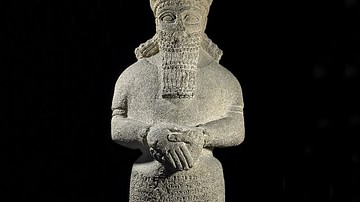The Cyrus Cylinder is a document issued by Cyrus the Great, consisting of a cylinder of clay inscribed in Akkadian cuneiform script. The cylinder was created in 539 BCE, surely by order of Cyrus the Great, when he took Babylon from Nabonidus, ending the Neo-Babylonian empire. This document is considered propaganda, praising the Achaemenid ruler Cyrus and treating Nabonidus like an impious and bad king.
The text can be divided into two parts:
- Lines one to 18 tell a story of Cyrus' deeds in the third person: the document tells of Nabonidus, the last Babylonian king, who is said to have forbidden the cult of Marduk, among others, and to have oppressed his subjects. Consequently, the subjects made complaints to the gods, and Marduk found Cyrus in order to make him the world's ruler. All the inhabitants of his new empire were very happy to see him as their new king.
- In the second part, Cyrus speaks in the first person. He begins with his titles and continues saying that he took care of Marduk's cult at Babylon, and that he had “allowed them to find rest from their exhaustion, their servitude”. He also tells that lots of kings bring him levies, and that he restored the cults in all the former kingdoms which are now part of his, and that he released the former deported persons.
Different interpretations of this document can and have been made:
- Formerly, some specialized historians took the text as a testimony close to reality, but today this interpretation is mostly out of use.
- Others see in this document confirmation of the Bible in its historicity, with Marduk assimilated to Yahweh. In the Bible, Cyrus is shown as Yahweh's object, and Yahweh gives him the power to create his kingdom and the will to release captive Jews and help them to rebuild their temple. The cylinder shows Cyrus saying: “the gods who dwelt there I returned to their home and let them move into an eternal dwelling. All their people I collected and brought them back to their homes,” (line 32) which could be confirming the release of captive Jews, even if these are not named in the text. One thing is clear: Cyrus chose to show that he has one powerful God at his side, Marduk, who gives him the legitimacy to overthrow Nabonidus and conquer his empire.
- Many historians today agree that this document is propaganda, in which Nabonidus is portrayed as worse than he was, using the Marduk cultists' anger against the last Babylonian king for this false portrayal.
- A recent current theory is to understand the Cyrus Cylinder as the first charter of human rights. This interpretation began when, in 1971 CE at the 2500th birthday of the Persian monarchy, the Shah Mohammed Reza Pahlavi made Cyrus the Great a key figure in government ideology, in order to establish a pre-Islamic legitimacy of his government. The same year, his dynasty offered a replica of the Cyrus Cylinder to the United Nations, with an English “translation” that is largely truncated and manipulated in order to show that Cyrus made the first charter of human rights.
The problem is that this latter translation is largely diffused by the UN and on the web, contributing to this idea, while speaking of human rights or charter is an anachronism. In fact, Cyrus had effectively made a policy of tolerance in some minor points, especially regarding the cults, and this policy was continued by his successors over 200 years later. But taking “(…) find rest (…) from their servitude (…)” (L.26) as an abolition of slavery, for example, is a total anachronism, as the existence of multiple kinds of slaves during Achaemenid rule proves. We surely should understand these tolerance policies more as a way to quickly assimilate new subjects in his empire, in order to have the least troubles possible therein.
Here is the more recent translation by Irving Finkel, Assistant Keeper, Department of the Middle East, British Museum (source):
- [When ... Mar]duk, king of the whole of heaven and earth, the ....... who, in his ..., lays waste his.......
- [........................................................................] broad? in intelligence, ...... who inspects (?) the wor]ld quarters (regions)
- [..............................................................…] his [first]born (=Belshazzar), a low person, was put in charge of his country,
- but [..................................................................................] he set [a (…) counter]feit over them.
- He ma[de] a counterfeit of Esagil, [and .....….......]... for Ur and the rest of the cult-cities.
- Rites inappropriate to them, [impure] fo[od-offerings ….......................................................] disrespectful […] were daily gabbled, and, as an insult,
- he brought the daily offerings to a halt; he inter[fered with the rites and] instituted […....] within the sanctuaries. In his mind, reverential fear of Marduk, king of the gods, came to an end.
- He did yet more evil to his city every day; … his [people ................…], he brought ruin on them all by a yoke without relief.
- Enlil-of-the-gods became extremely angry at their complaints, and […] their territory. The gods who lived within them left their shrines,
- angry that he had made (them) enter into Shuanna (Babylon). Ex[alted Marduk, Enlil-of-the-Go]ds, relented. He changed his mind about all the settlements whose sanctuaries were in ruins,
- and the population of the land of Sumer and Akkad who had become like corpses, and took pity on them. He inspected and checked all the countries,
- seeking for the upright king of his choice. He took the hand of Cyrus, king of the city of Anshan, and called him by his name, proclaiming him aloud for the kingship over all of everything.
- He made the land of Guti and all the Median troops prostrate themselves at his feet, while he shepherded in justice and righteousness the black-headed people
- whom he had put under his care. Marduk, the great lord, who nurtures his people, saw with pleasure his fine deeds and true heart,
- and ordered that he should go to Babylon. He had him take the road to Tintir (Babylon), and, like a friend and companion, he walked at his side.
- His vast troops whose number, like the water in a river, could not be counted, were marching fully-armed at his side.
- He had him enter without fighting or battle right into Shuanna; he saved his city Babylon from hardship. He handed over to him Nabonidus, the king who did not fear him.
- All the people of Tintir, of all Sumer and Akkad, nobles and governors, bowed down before him and kissed his feet, rejoicing over his kingship and their faces shone.
- The lord through whose help all were rescued from death and who saved them all from distress and hardship, they blessed him sweetly and praised his name.
- I am Cyrus, king of the universe, the great king, the powerful king, king of Babylon, king of Sumer and Akkad, king of the four quarters of the world,
- son of Cambyses, the great king, king of the city of Anshan, grandson of Cyrus, the great king, ki[ng of the ci]ty of Anshan, descendant of Teispes, the great king, king of the city of Anshan,
- the perpetual seed of kingship, whose reign Bel (Marduk)and Nabu love, and with whose kingship, to their joy, they concern themselves. When I went as harbinger of peace i[nt]o Babylon
- I founded my sovereign residence within the palace amid celebration and rejoicing. Marduk, the great lord, bestowed on me as my destiny the great magnanimity of one who loves Babylon, and I every day sought him out in awe.
- My vast troops were marching peaceably in Babylon, and the whole of [Sumer] and Akkad had nothing to fear.
- I sought the safety of the city of Babylon and all its sanctuaries. As for the population of Babylon […, w]ho as if without div[ine intention] had endured a yoke not decreed for them,
- I soothed their weariness; I freed them from their bonds(?). Marduk, the great lord, rejoiced at [my good] deeds,
- and he pronounced a sweet blessing over me, Cyrus, the king who fears him, and over Cambyses, the son [my] issue, [and over] my all my troops,
- that we might live happily in his presence, in well-being. At his exalted command, all kings who sit on thrones,
- from every quarter, from the Upper Sea to the Lower Sea, those who inhabit [remote distric]ts (and) the kings of the land of Amurru who live in tents, all of them,
- brought their weighty tribute into Shuanna, and kissed my feet. From [Shuanna] I sent back to their places to the city of Ashur and Susa,
- Akkad, the land of Eshnunna, the city of Zamban, the city of Meturnu, Der, as far as the border of the land of Guti - the sanctuaries across the river Tigris - whose shrines had earlier become dilapidated,
- the gods who lived therein, and made permanent sanctuaries for them. I collected together all of their people and returned them to their settlements,
- and the gods of the land of Sumer and Akkad which Nabonidus – to the fury of the lord of the gods – had brought into Shuanna, at the command of Marduk, the great lord,
- I returned them unharmed to their cells, in the sanctuaries that make them happy. May all the gods that I returned to their sanctuaries,
- every day before Bel and Nabu, ask for a long life for me, and mention my good deeds, and say to Marduk, my lord, this: “Cyrus, the king who fears you, and Cambyses his son,
- may they be the provisioners of our shrines until distant (?) days, and the population of Babylon call blessings on my kingship. I have enabled all the lands to live in peace.”
- Every day I increased by [… ge]ese, two ducks and ten pigeons the [former offerings] of geese, ducks and pigeons.
- I strove to strengthen the defences of the wall Imgur-Enlil, the great wall of Babylon,
- and [I completed] the quay of baked brick on the bank of the moat which an earlier king had bu[ilt but not com]pleted its work.
- [I …… which did not surround the city] outside, which no earlier king had built, his workforce, the levee [from his land, in/int]o Shuanna.
- [… ......................................................................with bitum]en and baked brick I built anew, and [completed] its [work].
- […...........................................................] great [doors of cedar wood] with bronze cladding,
- [and I installed] all their doors, threshold slabs and door fittings with copper parts. [….......................]. I saw within it an inscription of Ashurbanipal, a king who preceded me;
- […................................................] in its place. May Marduk, the great lord, present to me as a gift a long life and the fullness of age,
- [a secure throne and an enduring rei]gn, [and may I …... in] your heart forever.
a. [Written and check]ed [from a…]; (this) tablet (is) of
b. Qishti-Marduk, son of […].
Lines 1-2, and 44-5 are restored on the basis of two clay fragments from a Late Babylonian tablet, inscribed with text which duplicates that of the Cyrus Cylinder.


